Hyperkalemia and Barriers to Self-Management: A Detailed Report
VerifiedAdded on 2023/06/08
|8
|1781
|336
Report
AI Summary
This report examines hyperkalemia, a common clinical condition in end-stage renal disease patients, and the challenges associated with its self-management. The introduction highlights the causes, treatment, and importance of self-management, given the complex treatments and lifestyle modifications required. The report then explores various barriers, including low health literacy, lack of motivation, and limited understanding of the disease among patients. Provider barriers such as time constraints, lack of confidence, and communication challenges are also discussed. Additionally, system barriers like less incentives for education and health promotion, and low decision support tools are analyzed. The conclusion emphasizes the need for robust training and revised funding to improve self-management outcomes. The report is supported by several references.
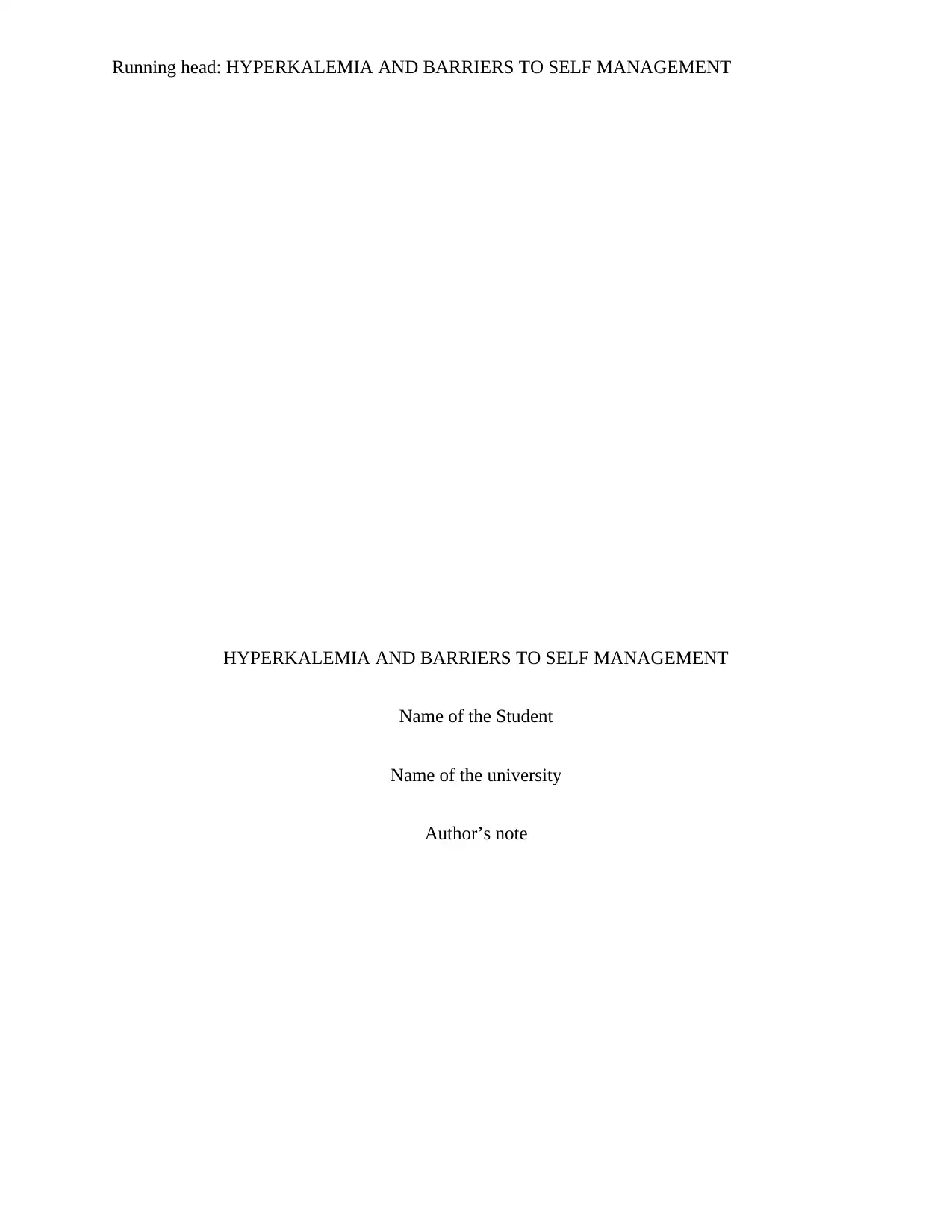
Running head: HYPERKALEMIA AND BARRIERS TO SELF MANAGEMENT
HYPERKALEMIA AND BARRIERS TO SELF MANAGEMENT
Name of the Student
Name of the university
Author’s note
HYPERKALEMIA AND BARRIERS TO SELF MANAGEMENT
Name of the Student
Name of the university
Author’s note
Paraphrase This Document
Need a fresh take? Get an instant paraphrase of this document with our AI Paraphraser
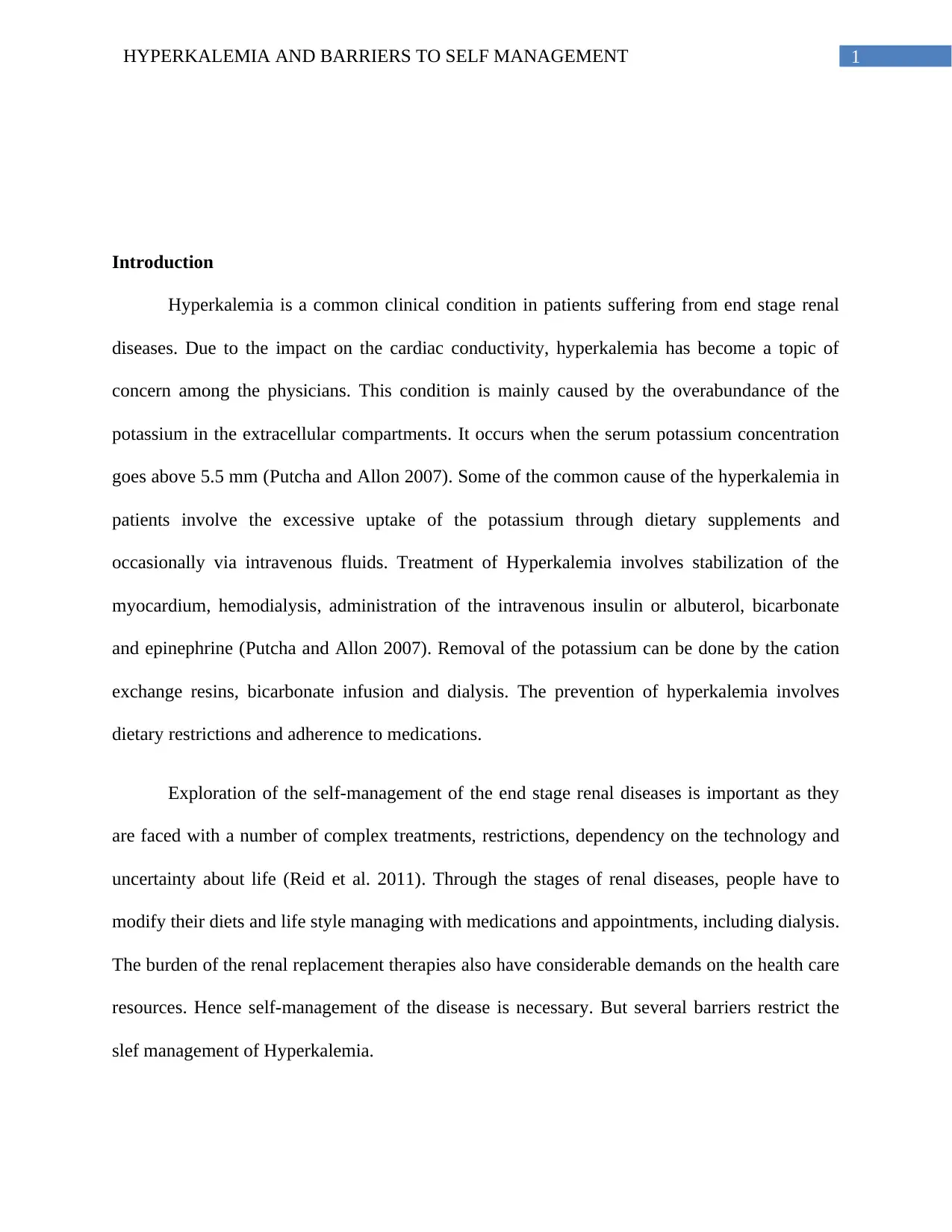
1HYPERKALEMIA AND BARRIERS TO SELF MANAGEMENT
Introduction
Hyperkalemia is a common clinical condition in patients suffering from end stage renal
diseases. Due to the impact on the cardiac conductivity, hyperkalemia has become a topic of
concern among the physicians. This condition is mainly caused by the overabundance of the
potassium in the extracellular compartments. It occurs when the serum potassium concentration
goes above 5.5 mm (Putcha and Allon 2007). Some of the common cause of the hyperkalemia in
patients involve the excessive uptake of the potassium through dietary supplements and
occasionally via intravenous fluids. Treatment of Hyperkalemia involves stabilization of the
myocardium, hemodialysis, administration of the intravenous insulin or albuterol, bicarbonate
and epinephrine (Putcha and Allon 2007). Removal of the potassium can be done by the cation
exchange resins, bicarbonate infusion and dialysis. The prevention of hyperkalemia involves
dietary restrictions and adherence to medications.
Exploration of the self-management of the end stage renal diseases is important as they
are faced with a number of complex treatments, restrictions, dependency on the technology and
uncertainty about life (Reid et al. 2011). Through the stages of renal diseases, people have to
modify their diets and life style managing with medications and appointments, including dialysis.
The burden of the renal replacement therapies also have considerable demands on the health care
resources. Hence self-management of the disease is necessary. But several barriers restrict the
slef management of Hyperkalemia.
Introduction
Hyperkalemia is a common clinical condition in patients suffering from end stage renal
diseases. Due to the impact on the cardiac conductivity, hyperkalemia has become a topic of
concern among the physicians. This condition is mainly caused by the overabundance of the
potassium in the extracellular compartments. It occurs when the serum potassium concentration
goes above 5.5 mm (Putcha and Allon 2007). Some of the common cause of the hyperkalemia in
patients involve the excessive uptake of the potassium through dietary supplements and
occasionally via intravenous fluids. Treatment of Hyperkalemia involves stabilization of the
myocardium, hemodialysis, administration of the intravenous insulin or albuterol, bicarbonate
and epinephrine (Putcha and Allon 2007). Removal of the potassium can be done by the cation
exchange resins, bicarbonate infusion and dialysis. The prevention of hyperkalemia involves
dietary restrictions and adherence to medications.
Exploration of the self-management of the end stage renal diseases is important as they
are faced with a number of complex treatments, restrictions, dependency on the technology and
uncertainty about life (Reid et al. 2011). Through the stages of renal diseases, people have to
modify their diets and life style managing with medications and appointments, including dialysis.
The burden of the renal replacement therapies also have considerable demands on the health care
resources. Hence self-management of the disease is necessary. But several barriers restrict the
slef management of Hyperkalemia.
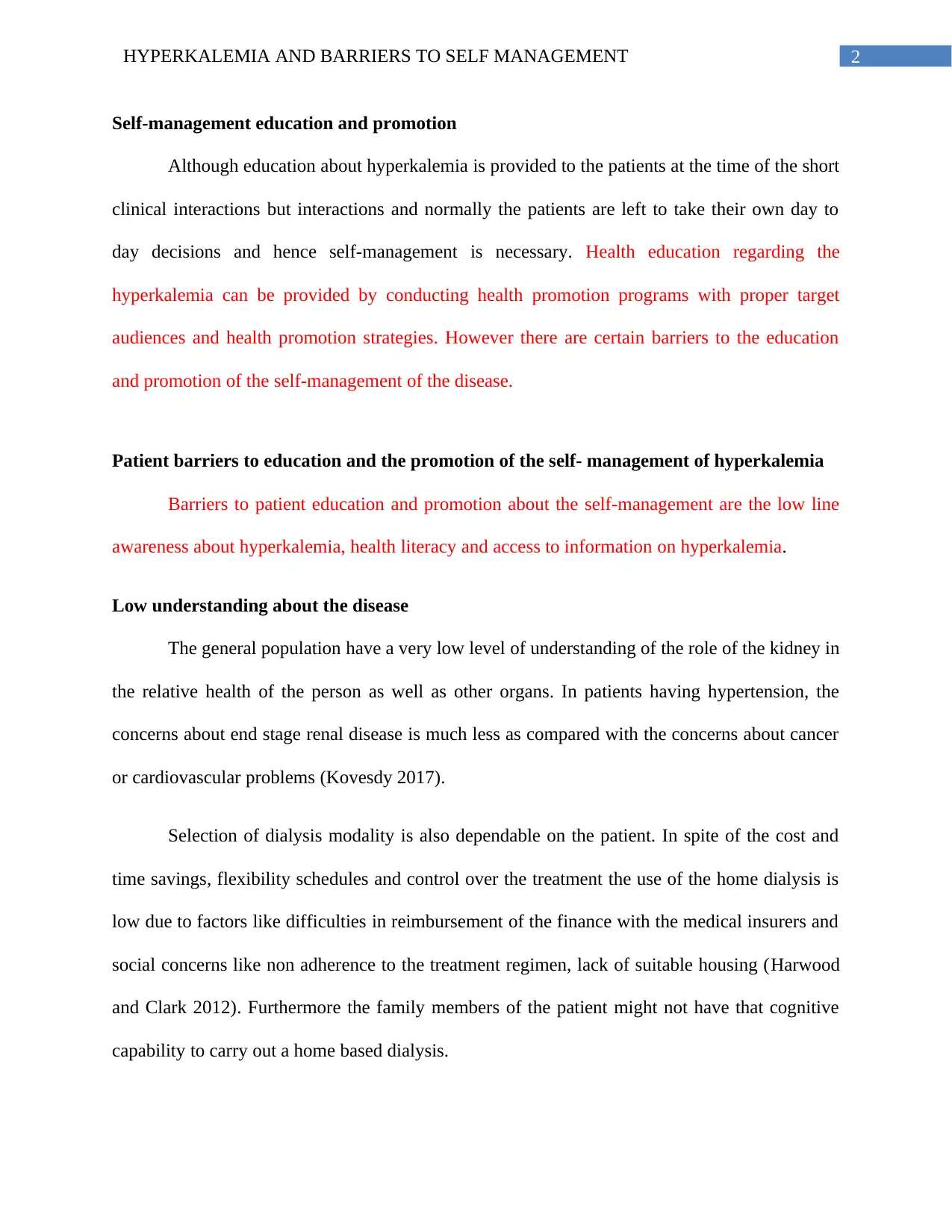
2HYPERKALEMIA AND BARRIERS TO SELF MANAGEMENT
Self-management education and promotion
Although education about hyperkalemia is provided to the patients at the time of the short
clinical interactions but interactions and normally the patients are left to take their own day to
day decisions and hence self-management is necessary. Health education regarding the
hyperkalemia can be provided by conducting health promotion programs with proper target
audiences and health promotion strategies. However there are certain barriers to the education
and promotion of the self-management of the disease.
Patient barriers to education and the promotion of the self- management of hyperkalemia
Barriers to patient education and promotion about the self-management are the low line
awareness about hyperkalemia, health literacy and access to information on hyperkalemia.
Low understanding about the disease
The general population have a very low level of understanding of the role of the kidney in
the relative health of the person as well as other organs. In patients having hypertension, the
concerns about end stage renal disease is much less as compared with the concerns about cancer
or cardiovascular problems (Kovesdy 2017).
Selection of dialysis modality is also dependable on the patient. In spite of the cost and
time savings, flexibility schedules and control over the treatment the use of the home dialysis is
low due to factors like difficulties in reimbursement of the finance with the medical insurers and
social concerns like non adherence to the treatment regimen, lack of suitable housing (Harwood
and Clark 2012). Furthermore the family members of the patient might not have that cognitive
capability to carry out a home based dialysis.
Self-management education and promotion
Although education about hyperkalemia is provided to the patients at the time of the short
clinical interactions but interactions and normally the patients are left to take their own day to
day decisions and hence self-management is necessary. Health education regarding the
hyperkalemia can be provided by conducting health promotion programs with proper target
audiences and health promotion strategies. However there are certain barriers to the education
and promotion of the self-management of the disease.
Patient barriers to education and the promotion of the self- management of hyperkalemia
Barriers to patient education and promotion about the self-management are the low line
awareness about hyperkalemia, health literacy and access to information on hyperkalemia.
Low understanding about the disease
The general population have a very low level of understanding of the role of the kidney in
the relative health of the person as well as other organs. In patients having hypertension, the
concerns about end stage renal disease is much less as compared with the concerns about cancer
or cardiovascular problems (Kovesdy 2017).
Selection of dialysis modality is also dependable on the patient. In spite of the cost and
time savings, flexibility schedules and control over the treatment the use of the home dialysis is
low due to factors like difficulties in reimbursement of the finance with the medical insurers and
social concerns like non adherence to the treatment regimen, lack of suitable housing (Harwood
and Clark 2012). Furthermore the family members of the patient might not have that cognitive
capability to carry out a home based dialysis.
⊘ This is a preview!⊘
Do you want full access?
Subscribe today to unlock all pages.

Trusted by 1+ million students worldwide
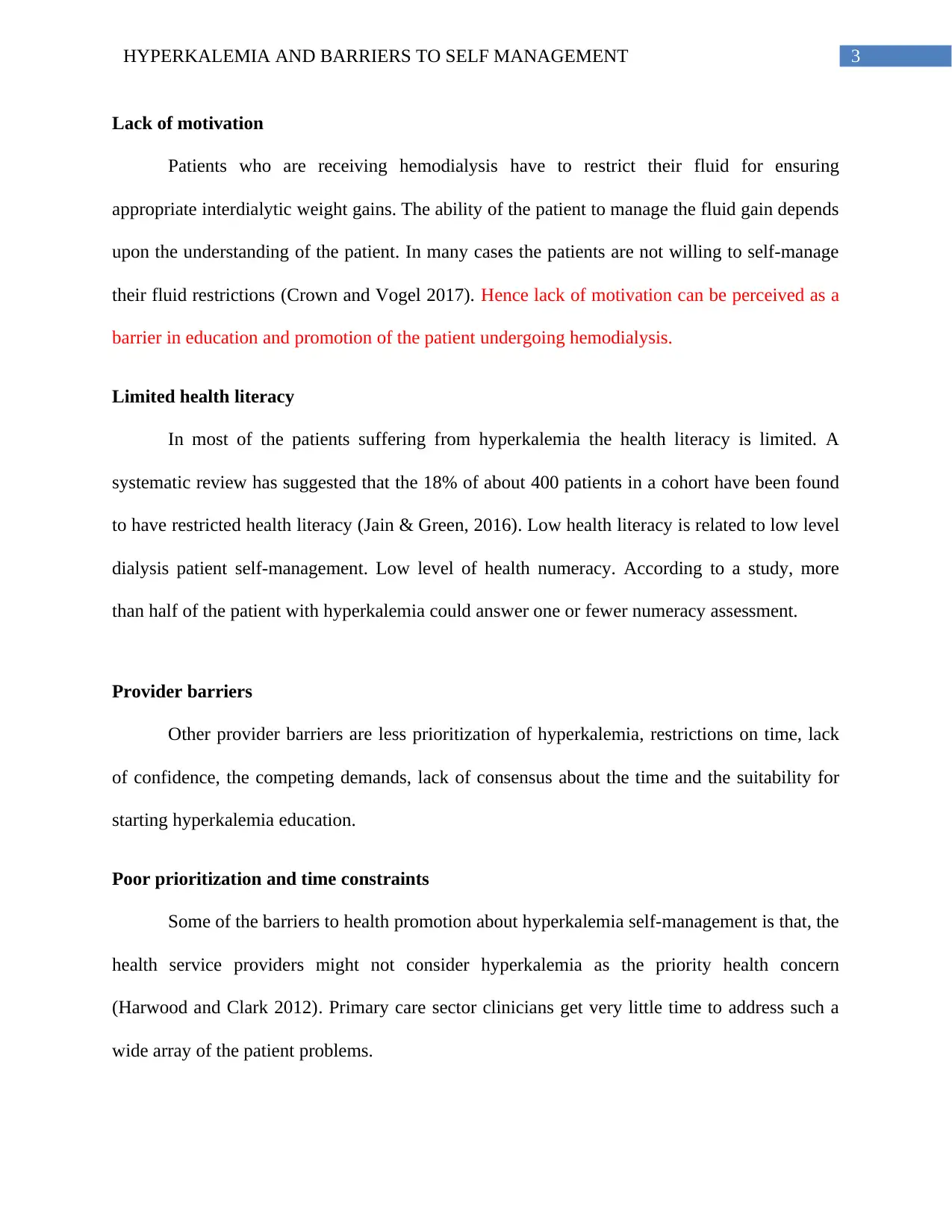
3HYPERKALEMIA AND BARRIERS TO SELF MANAGEMENT
Lack of motivation
Patients who are receiving hemodialysis have to restrict their fluid for ensuring
appropriate interdialytic weight gains. The ability of the patient to manage the fluid gain depends
upon the understanding of the patient. In many cases the patients are not willing to self-manage
their fluid restrictions (Crown and Vogel 2017). Hence lack of motivation can be perceived as a
barrier in education and promotion of the patient undergoing hemodialysis.
Limited health literacy
In most of the patients suffering from hyperkalemia the health literacy is limited. A
systematic review has suggested that the 18% of about 400 patients in a cohort have been found
to have restricted health literacy (Jain & Green, 2016). Low health literacy is related to low level
dialysis patient self-management. Low level of health numeracy. According to a study, more
than half of the patient with hyperkalemia could answer one or fewer numeracy assessment.
Provider barriers
Other provider barriers are less prioritization of hyperkalemia, restrictions on time, lack
of confidence, the competing demands, lack of consensus about the time and the suitability for
starting hyperkalemia education.
Poor prioritization and time constraints
Some of the barriers to health promotion about hyperkalemia self-management is that, the
health service providers might not consider hyperkalemia as the priority health concern
(Harwood and Clark 2012). Primary care sector clinicians get very little time to address such a
wide array of the patient problems.
Lack of motivation
Patients who are receiving hemodialysis have to restrict their fluid for ensuring
appropriate interdialytic weight gains. The ability of the patient to manage the fluid gain depends
upon the understanding of the patient. In many cases the patients are not willing to self-manage
their fluid restrictions (Crown and Vogel 2017). Hence lack of motivation can be perceived as a
barrier in education and promotion of the patient undergoing hemodialysis.
Limited health literacy
In most of the patients suffering from hyperkalemia the health literacy is limited. A
systematic review has suggested that the 18% of about 400 patients in a cohort have been found
to have restricted health literacy (Jain & Green, 2016). Low health literacy is related to low level
dialysis patient self-management. Low level of health numeracy. According to a study, more
than half of the patient with hyperkalemia could answer one or fewer numeracy assessment.
Provider barriers
Other provider barriers are less prioritization of hyperkalemia, restrictions on time, lack
of confidence, the competing demands, lack of consensus about the time and the suitability for
starting hyperkalemia education.
Poor prioritization and time constraints
Some of the barriers to health promotion about hyperkalemia self-management is that, the
health service providers might not consider hyperkalemia as the priority health concern
(Harwood and Clark 2012). Primary care sector clinicians get very little time to address such a
wide array of the patient problems.
Paraphrase This Document
Need a fresh take? Get an instant paraphrase of this document with our AI Paraphraser
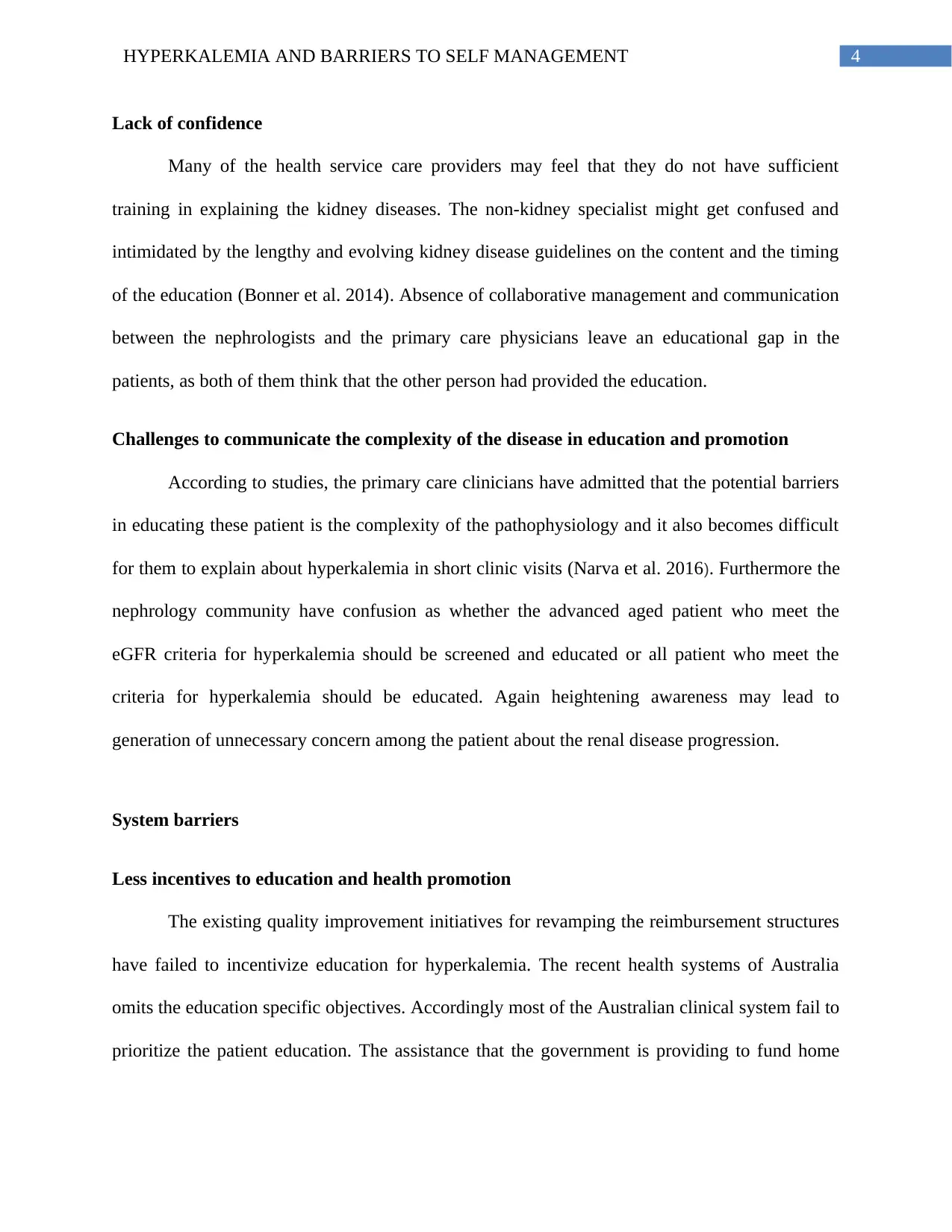
4HYPERKALEMIA AND BARRIERS TO SELF MANAGEMENT
Lack of confidence
Many of the health service care providers may feel that they do not have sufficient
training in explaining the kidney diseases. The non-kidney specialist might get confused and
intimidated by the lengthy and evolving kidney disease guidelines on the content and the timing
of the education (Bonner et al. 2014). Absence of collaborative management and communication
between the nephrologists and the primary care physicians leave an educational gap in the
patients, as both of them think that the other person had provided the education.
Challenges to communicate the complexity of the disease in education and promotion
According to studies, the primary care clinicians have admitted that the potential barriers
in educating these patient is the complexity of the pathophysiology and it also becomes difficult
for them to explain about hyperkalemia in short clinic visits (Narva et al. 2016). Furthermore the
nephrology community have confusion as whether the advanced aged patient who meet the
eGFR criteria for hyperkalemia should be screened and educated or all patient who meet the
criteria for hyperkalemia should be educated. Again heightening awareness may lead to
generation of unnecessary concern among the patient about the renal disease progression.
System barriers
Less incentives to education and health promotion
The existing quality improvement initiatives for revamping the reimbursement structures
have failed to incentivize education for hyperkalemia. The recent health systems of Australia
omits the education specific objectives. Accordingly most of the Australian clinical system fail to
prioritize the patient education. The assistance that the government is providing to fund home
Lack of confidence
Many of the health service care providers may feel that they do not have sufficient
training in explaining the kidney diseases. The non-kidney specialist might get confused and
intimidated by the lengthy and evolving kidney disease guidelines on the content and the timing
of the education (Bonner et al. 2014). Absence of collaborative management and communication
between the nephrologists and the primary care physicians leave an educational gap in the
patients, as both of them think that the other person had provided the education.
Challenges to communicate the complexity of the disease in education and promotion
According to studies, the primary care clinicians have admitted that the potential barriers
in educating these patient is the complexity of the pathophysiology and it also becomes difficult
for them to explain about hyperkalemia in short clinic visits (Narva et al. 2016). Furthermore the
nephrology community have confusion as whether the advanced aged patient who meet the
eGFR criteria for hyperkalemia should be screened and educated or all patient who meet the
criteria for hyperkalemia should be educated. Again heightening awareness may lead to
generation of unnecessary concern among the patient about the renal disease progression.
System barriers
Less incentives to education and health promotion
The existing quality improvement initiatives for revamping the reimbursement structures
have failed to incentivize education for hyperkalemia. The recent health systems of Australia
omits the education specific objectives. Accordingly most of the Australian clinical system fail to
prioritize the patient education. The assistance that the government is providing to fund home
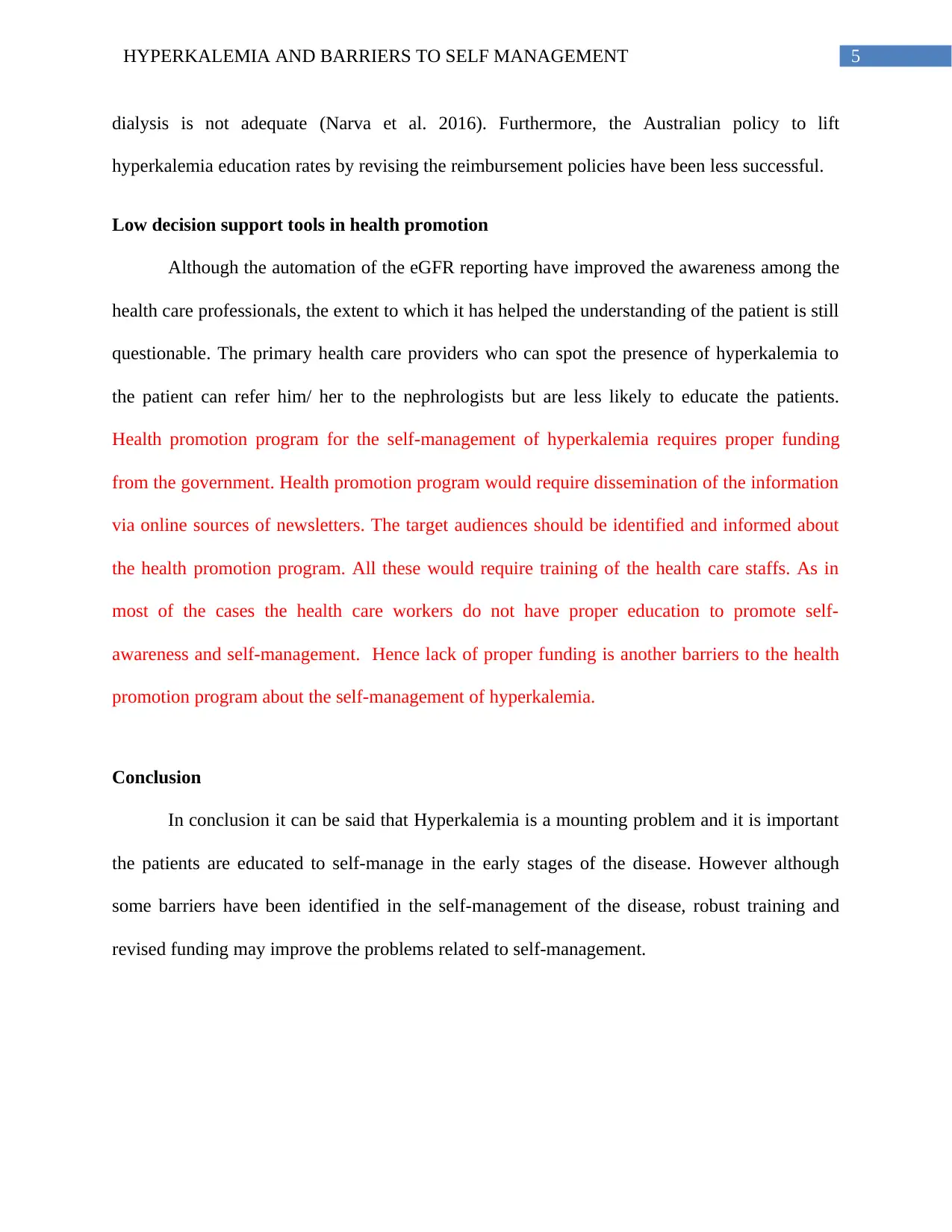
5HYPERKALEMIA AND BARRIERS TO SELF MANAGEMENT
dialysis is not adequate (Narva et al. 2016). Furthermore, the Australian policy to lift
hyperkalemia education rates by revising the reimbursement policies have been less successful.
Low decision support tools in health promotion
Although the automation of the eGFR reporting have improved the awareness among the
health care professionals, the extent to which it has helped the understanding of the patient is still
questionable. The primary health care providers who can spot the presence of hyperkalemia to
the patient can refer him/ her to the nephrologists but are less likely to educate the patients.
Health promotion program for the self-management of hyperkalemia requires proper funding
from the government. Health promotion program would require dissemination of the information
via online sources of newsletters. The target audiences should be identified and informed about
the health promotion program. All these would require training of the health care staffs. As in
most of the cases the health care workers do not have proper education to promote self-
awareness and self-management. Hence lack of proper funding is another barriers to the health
promotion program about the self-management of hyperkalemia.
Conclusion
In conclusion it can be said that Hyperkalemia is a mounting problem and it is important
the patients are educated to self-manage in the early stages of the disease. However although
some barriers have been identified in the self-management of the disease, robust training and
revised funding may improve the problems related to self-management.
dialysis is not adequate (Narva et al. 2016). Furthermore, the Australian policy to lift
hyperkalemia education rates by revising the reimbursement policies have been less successful.
Low decision support tools in health promotion
Although the automation of the eGFR reporting have improved the awareness among the
health care professionals, the extent to which it has helped the understanding of the patient is still
questionable. The primary health care providers who can spot the presence of hyperkalemia to
the patient can refer him/ her to the nephrologists but are less likely to educate the patients.
Health promotion program for the self-management of hyperkalemia requires proper funding
from the government. Health promotion program would require dissemination of the information
via online sources of newsletters. The target audiences should be identified and informed about
the health promotion program. All these would require training of the health care staffs. As in
most of the cases the health care workers do not have proper education to promote self-
awareness and self-management. Hence lack of proper funding is another barriers to the health
promotion program about the self-management of hyperkalemia.
Conclusion
In conclusion it can be said that Hyperkalemia is a mounting problem and it is important
the patients are educated to self-manage in the early stages of the disease. However although
some barriers have been identified in the self-management of the disease, robust training and
revised funding may improve the problems related to self-management.
⊘ This is a preview!⊘
Do you want full access?
Subscribe today to unlock all pages.

Trusted by 1+ million students worldwide
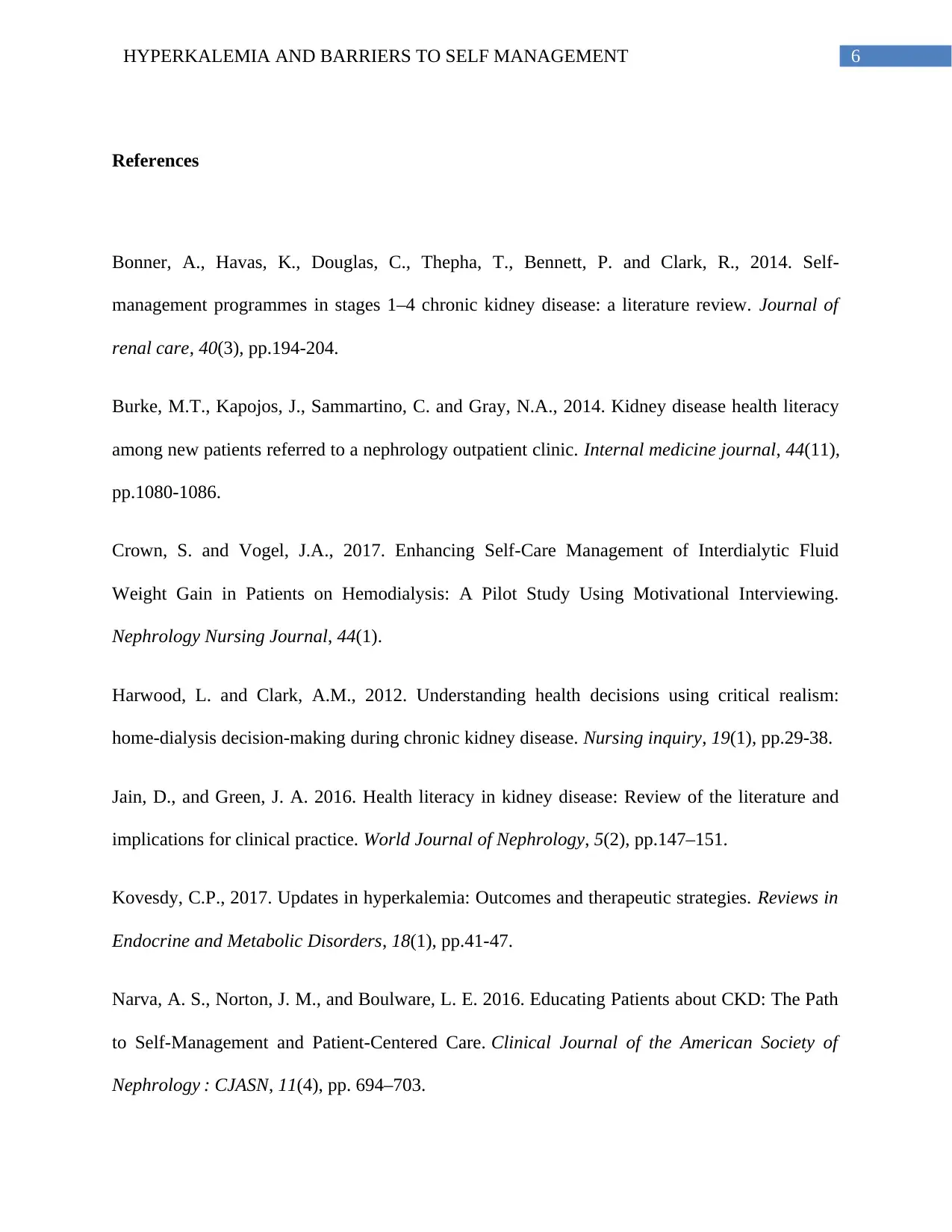
6HYPERKALEMIA AND BARRIERS TO SELF MANAGEMENT
References
Bonner, A., Havas, K., Douglas, C., Thepha, T., Bennett, P. and Clark, R., 2014. Self‐
management programmes in stages 1–4 chronic kidney disease: a literature review. Journal of
renal care, 40(3), pp.194-204.
Burke, M.T., Kapojos, J., Sammartino, C. and Gray, N.A., 2014. Kidney disease health literacy
among new patients referred to a nephrology outpatient clinic. Internal medicine journal, 44(11),
pp.1080-1086.
Crown, S. and Vogel, J.A., 2017. Enhancing Self-Care Management of Interdialytic Fluid
Weight Gain in Patients on Hemodialysis: A Pilot Study Using Motivational Interviewing.
Nephrology Nursing Journal, 44(1).
Harwood, L. and Clark, A.M., 2012. Understanding health decisions using critical realism:
home‐dialysis decision‐making during chronic kidney disease. Nursing inquiry, 19(1), pp.29-38.
Jain, D., and Green, J. A. 2016. Health literacy in kidney disease: Review of the literature and
implications for clinical practice. World Journal of Nephrology, 5(2), pp.147–151.
Kovesdy, C.P., 2017. Updates in hyperkalemia: Outcomes and therapeutic strategies. Reviews in
Endocrine and Metabolic Disorders, 18(1), pp.41-47.
Narva, A. S., Norton, J. M., and Boulware, L. E. 2016. Educating Patients about CKD: The Path
to Self-Management and Patient-Centered Care. Clinical Journal of the American Society of
Nephrology : CJASN, 11(4), pp. 694–703.
References
Bonner, A., Havas, K., Douglas, C., Thepha, T., Bennett, P. and Clark, R., 2014. Self‐
management programmes in stages 1–4 chronic kidney disease: a literature review. Journal of
renal care, 40(3), pp.194-204.
Burke, M.T., Kapojos, J., Sammartino, C. and Gray, N.A., 2014. Kidney disease health literacy
among new patients referred to a nephrology outpatient clinic. Internal medicine journal, 44(11),
pp.1080-1086.
Crown, S. and Vogel, J.A., 2017. Enhancing Self-Care Management of Interdialytic Fluid
Weight Gain in Patients on Hemodialysis: A Pilot Study Using Motivational Interviewing.
Nephrology Nursing Journal, 44(1).
Harwood, L. and Clark, A.M., 2012. Understanding health decisions using critical realism:
home‐dialysis decision‐making during chronic kidney disease. Nursing inquiry, 19(1), pp.29-38.
Jain, D., and Green, J. A. 2016. Health literacy in kidney disease: Review of the literature and
implications for clinical practice. World Journal of Nephrology, 5(2), pp.147–151.
Kovesdy, C.P., 2017. Updates in hyperkalemia: Outcomes and therapeutic strategies. Reviews in
Endocrine and Metabolic Disorders, 18(1), pp.41-47.
Narva, A. S., Norton, J. M., and Boulware, L. E. 2016. Educating Patients about CKD: The Path
to Self-Management and Patient-Centered Care. Clinical Journal of the American Society of
Nephrology : CJASN, 11(4), pp. 694–703.
Paraphrase This Document
Need a fresh take? Get an instant paraphrase of this document with our AI Paraphraser
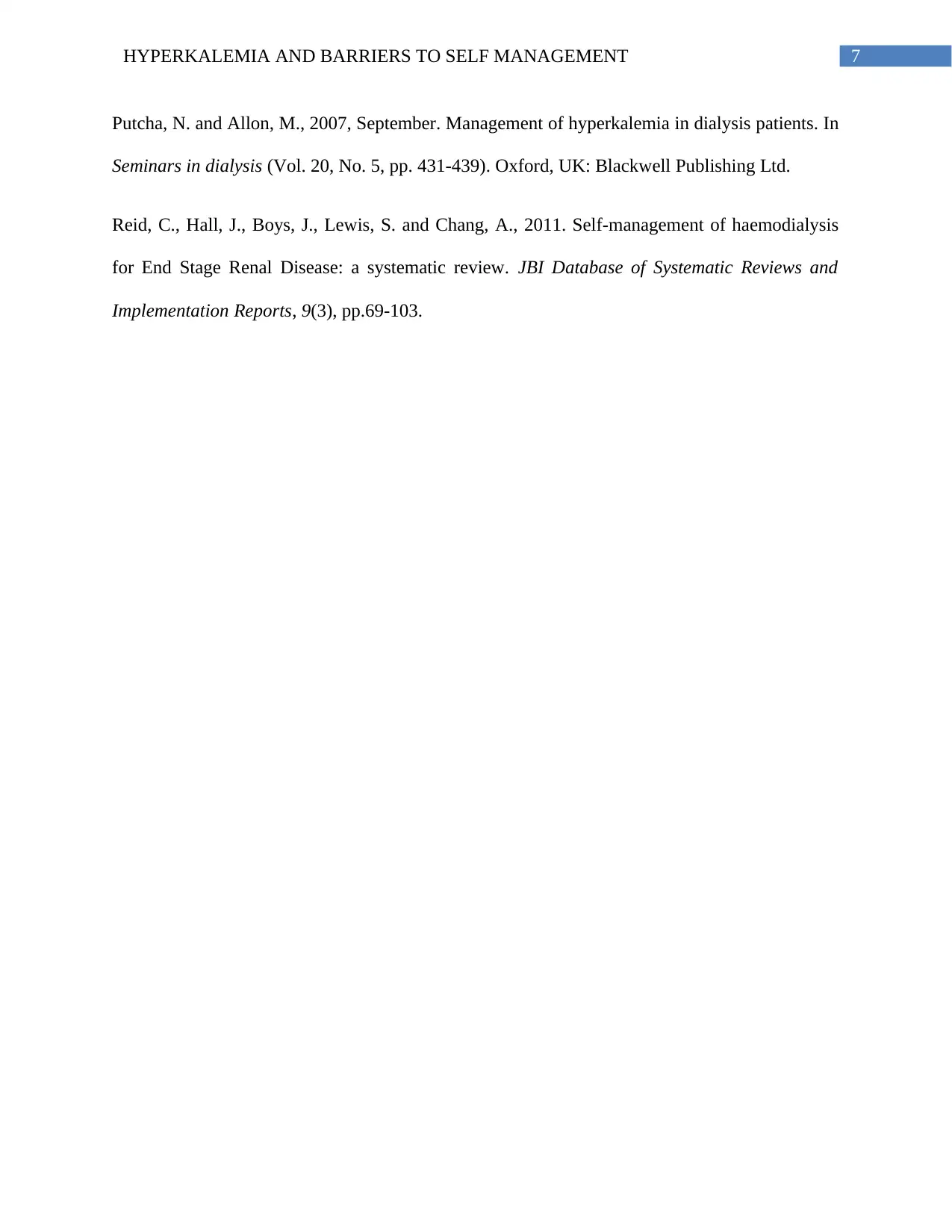
7HYPERKALEMIA AND BARRIERS TO SELF MANAGEMENT
Putcha, N. and Allon, M., 2007, September. Management of hyperkalemia in dialysis patients. In
Seminars in dialysis (Vol. 20, No. 5, pp. 431-439). Oxford, UK: Blackwell Publishing Ltd.
Reid, C., Hall, J., Boys, J., Lewis, S. and Chang, A., 2011. Self-management of haemodialysis
for End Stage Renal Disease: a systematic review. JBI Database of Systematic Reviews and
Implementation Reports, 9(3), pp.69-103.
Putcha, N. and Allon, M., 2007, September. Management of hyperkalemia in dialysis patients. In
Seminars in dialysis (Vol. 20, No. 5, pp. 431-439). Oxford, UK: Blackwell Publishing Ltd.
Reid, C., Hall, J., Boys, J., Lewis, S. and Chang, A., 2011. Self-management of haemodialysis
for End Stage Renal Disease: a systematic review. JBI Database of Systematic Reviews and
Implementation Reports, 9(3), pp.69-103.
1 out of 8
Related Documents
Your All-in-One AI-Powered Toolkit for Academic Success.
+13062052269
info@desklib.com
Available 24*7 on WhatsApp / Email
![[object Object]](/_next/static/media/star-bottom.7253800d.svg)
Unlock your academic potential
Copyright © 2020–2026 A2Z Services. All Rights Reserved. Developed and managed by ZUCOL.




